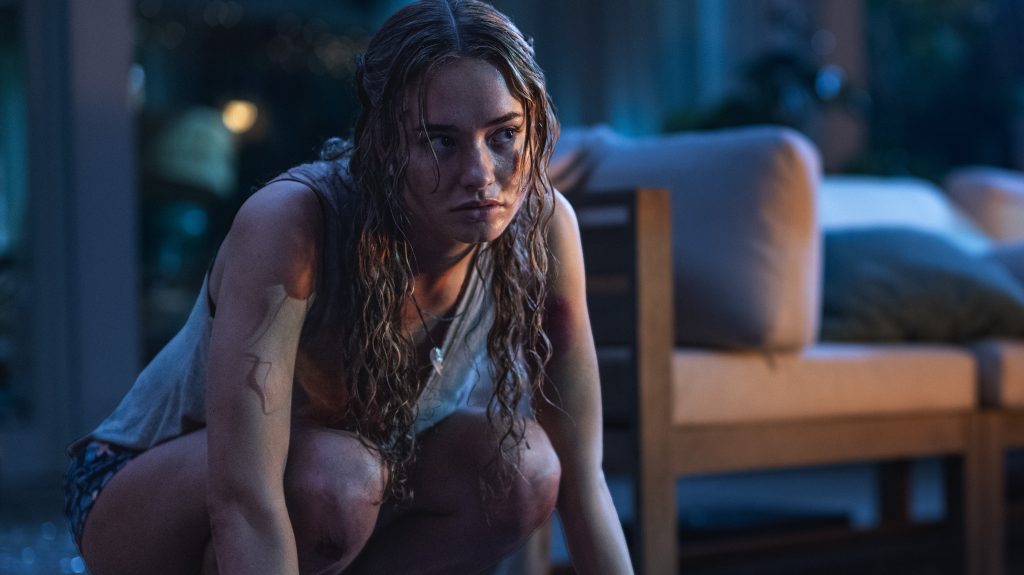If that one scene in Nope (you know the one) wasn’t enough to convince you that owning a chimpanzee is a bad idea, Primate is here to remind you that these animals can literally rip you limb from limb. Directed by Johannes Roberts, who also co-wrote the script with Ernest Riera, the film is scheduled to release in January—and if it wasn’t on your radar before, allow me to firmly add it.
PSA: Primate Proves That Chimps Are Not Pets (But They Are Great Slasher Killers)
Primate begins with a pre-credits scene introducing us to the danger: a vet has been called to check in on a chimp named Ben that isn’t feeling so hot, only to discover the hard way that the super-strong animal has gone rabid. It’s an evocative opening, though it does create a little timeline confusion when we jump back in time a few days to follow Lucy (Johnny Sequoyah) as she returns home to Hawaii to see her family and their unusual pet.
Her late mother, we learn, worked with Ben for years before her death, and he remains a beloved member of the family, able to communicate most basic needs via the use of sign language and a special tablet. Ben is acting a little off, though, so Lucy’s father (Academy Award-winner Troy Kotsur, in a stand-out role) calls in the vet we’ve already seen die before heading out for the night.
Of course, we know that Ben has rabies, so it’s only a matter of time before he goes bananas. In the meantime, Lucy, her sister, and their friends get to living it up while they have the place to themselves. The family owns a gorgeous secluded mansion complete with a cliffside infinity pool, and if you’ve seen The Strangers: Prey at Night, you’ll know Roberts loves a pool. He quickly finds a reason to drive the young people into it and trap them there—but just because chimps can’t swim, that doesn’t mean they’re safe.
Blending Animal Attack Horror with Slasher Thrills in Primate
One of the biggest things going for Primate is its ability to blend classic animal attack horror with slasher elements. The film draws clear inspiration from Cujo, but where the Trentons were largely safe from the beast’s foaming maw (if not the sun) so long as they stayed inside their vehicle, Lucy and friends aren’t so lucky. As the tagline for Primate warns, Ben is “dangerously close to human,” which means he understands how to use tools and constantly finds creative ways to take a swipe at his prey whenever they and the audience let their guard down. The sicker the chimp gets, the more he seems to radiate a savage, all-too-human glee.
At the same time, Roberts and Riera’s script leverages the communication gap between Ben and the family to devastating effect. Ben is so close to being able to tell them what’s wrong before his rabies progresses to the point of no return, but he doesn’t quite have the language. The fact that Lucy’s father is deaf adds an additional layer to the tragedy: we see how expressive the family is able to be through non-verbal communication, yet Ben is still isolated in his misery.
Toward the climax, however, even this form of communication starts to break down as the girls’ screams go unheard. While it feels like there’s more material that could have been wrung from this theme, it’s notable that Ben goes for the mouth more than once during his rampage, including in the film’s most memorable kill. In the end, maybe all communication is meaningless when nature decides to play a cruel prank.
Miguel Torres Umba’s Incredible Performance as Rabid Chimp Ben
This tragic aspect of the story doesn’t dampen the scares or thrills. Movement specialist Miguel Torres Umba, who portrays Ben, initially imbues the chimp with lovable warmth that makes his feverish, trembling intensity all the more frightening as the sickness takes hold. It’s a remarkable performance, one that lulls the audience into a similar state of wishful thinking to Lucy as she repeatedly reaches out to Ben in the hope that some part of the pet she loved is still in there. Primate rewards that desperate desire with brutal bites, bludgeonings, and beyond.
Primate Is a Lean, Mean, Face-Ripping Machine
Animal attack horror movies have trended hard toward sharks in the last decade (a world Roberts is no stranger to, having helmed 47 Meters Down and its sequel). It’s exciting to see a new addition to this subgenre focusing on a lesser-seen aggressor, especially one that doesn’t frame its killer creature as inherently evil, but rather a victim of both a natural blight and human foolishness. Ben should never have been put in the position he’s in—but now he’s here, it’s pulse-poundingly fun to see the damage that 100+ pounds of pure muscle can do when its brain is on fire.
Primate attacks theaters on January 9.
